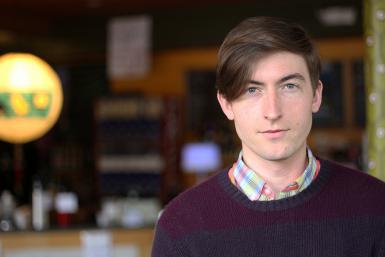Sheaffer named one of Variety’s ‘110 Students to Watch’

The film industry is keeping an eye on Media School doctoral student Russell Sheaffer.
In the latest of a string of accolades for Sheaffer, Variety magazine featured him as one of “110 Students to Watch” in its annual Education Impact Report issued April 28. He’s the only student from Indiana to make the list.
The entertainment trade publication reached out to IU earlier this year and asked for nominations. IU Cinema director Jon Vickers immediately suggested Sheaffer.
“He is, in my mind, not only a great student and a good teacher, but also a phenomenal filmmaker,” Vickers said. “He is the perfect candidate for IU to put forward.”
Since 2008, Sheaffer has produced, directed, edited or co-written dozens of films and documentaries, many of which have been selected for festivals around the country and in Canada.
Sheaffer earned a degree in film and media studies from the University of California, Irvine, and a master’s degree in cinema studies from New York University. At NYU, he co-wrote and co-directed Masculinity and Me with actor and filmmaker James Franco.
He said knew he wanted to come to IU for his Ph.D. when he visited the Kinsey Institute for Research in Sex, Gender and Reproduction to view films for a project.
“I came here for a week and just spent an entire week locked inside the Kinsey working,” Sheaffer said. “I got to explore around campus and fell in love.”
At IU he has studied, taught, lectured, produced and screened an ever-growing list of films. He also has been instrumental in organizing film festivals on campus, such as the Iris Film Festival, Underground Film Festival and Orphans: Midwest, an offshoot of the Orphan Film Symposium 7 he co-curated in New York in 2010.
Vickers worked with Sheaffer in numerous ways at the cinema, including the Underground Film Series and screening Sheaffer’s recent film, Masculinity/Femininity.
But Sheaffer’s work has taken him off campus, too. He worked on The Diplomat, a film about Title IX for ESPN that was nominated for three sports Emmys. And his work has been featured at festivals, symposiums and museums around the world, including Sundance Film Festival in 2010 and Tribeca Film Festival in 2014.
The film shown at Tribeca was Acetate Diary, a three-minute silent piece created on 16mm film. The work is camera-less; Sheaffer used the 100 feet of film to write a diary of his emotions, directly etching, painting and cutting into the film.
“It seems to me that I just have to be willing and able to pour myself into whatever work I am doing, and then it feels right,” Sheaffer said.
In order to show the film at Tribeca, he had to enlarge it to 35mm, an expensive undertaking. When he turned to Vickers and film lecturer Susanne Schwibs, they went to different units on campus to ask for funding for Sheaffer’s film.
“He is incredibly imaginative and creative, but he combines it with a really personal perspective,” Schwibs said. “What he does is truly original.”
Sheaffer also straddles a remarkable line studying both the theory and the production of film.
”So much of the work that I do is really engaged with theory in some way,” Sheaffer explained.
Schwibs has mentored Sheaffer in his doctoral degree pursuits and has overseen his undergraduate teaching. His dual interests have helped him be more engaged with the students he teaches, she said.
“He is a creative filmmaker, a very well-read scholar and an excellent teacher,” Schwibs said. “You can tell because students in his classes are committed and very innovative.
She said Sheaffer also proposes ideas for new courses, bringing his real-world experiences to the classroom. In 2014, Sheaffer received the Communication and Culture Departmental Teaching Award in recognition of his work with C435 Documentary Filmmaking: Theory and Practice.
Sheaffer said he loves working with students to expand the ways they think about filmmaking.
“When people are younger and just starting to be challenged, a lot of really exciting moments are happening,” he said. “These are growing moments.”
Sheaffer has a particular interest in teaching and learning about experimental filmmaking.
“Experimental filmmaking encompasses this huge range, where people are pushing back on traditional film making practice in some way,” he said. He often uses film rather than digital media for these projects. “I think I’m more curious about what I can hold and I can touch and I can paint and I can cut.”
For his dissertation, Sheaffer is working with film from the Kinsey Institute. It brings his initial contact with IU full-circle, he said. He was recently awarded the John Money Scholars of Sexology fellowship to pursue his research.
Sheaffer is author of numerous articles for publications as diverse as Huffington Post and peer-reviewed journals, and he has presented his work at conferences.
Schwibs foresees Sheaffer’s successes continuing, both in the classroom and on the screen.
“I think we’ll hear more and more about him,” she said. “And see more and more of his movies.”
More:

